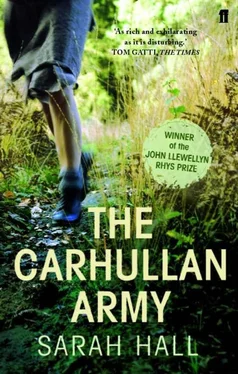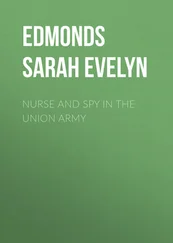Sarah Hall - The Carhullan Army
Здесь есть возможность читать онлайн «Sarah Hall - The Carhullan Army» весь текст электронной книги совершенно бесплатно (целиком полную версию без сокращений). В некоторых случаях можно слушать аудио, скачать через торрент в формате fb2 и присутствует краткое содержание. Год выпуска: 2008, Издательство: Faber and Faber, Жанр: Современная проза, на английском языке. Описание произведения, (предисловие) а так же отзывы посетителей доступны на портале библиотеки ЛибКат.
- Название:The Carhullan Army
- Автор:
- Издательство:Faber and Faber
- Жанр:
- Год:2008
- ISBN:нет данных
- Рейтинг книги:4 / 5. Голосов: 1
-
Избранное:Добавить в избранное
- Отзывы:
-
Ваша оценка:
- 80
- 1
- 2
- 3
- 4
- 5
The Carhullan Army: краткое содержание, описание и аннотация
Предлагаем к чтению аннотацию, описание, краткое содержание или предисловие (зависит от того, что написал сам автор книги «The Carhullan Army»). Если вы не нашли необходимую информацию о книге — напишите в комментариях, мы постараемся отыскать её.
The Carhullan Army — читать онлайн бесплатно полную книгу (весь текст) целиком
Ниже представлен текст книги, разбитый по страницам. Система сохранения места последней прочитанной страницы, позволяет с удобством читать онлайн бесплатно книгу «The Carhullan Army», без необходимости каждый раз заново искать на чём Вы остановились. Поставьте закладку, и сможете в любой момент перейти на страницу, на которой закончили чтение.
Интервал:
Закладка:
Sarah Hall
The Carhullan Army
For Jane and Mae
NOTICE
English Authority Penal System archive — record no.498: Transcript recovered from site of Lancaster holding dock
Statement of female prisoner detained under Section 4(b) of the Insurgency Prevention (Unrestricted Powers) Act
FILE ONE: COMPLETE RECOVERY
My name is Sister.
This is the name that was given to me three years ago. It is what the others called me. It is what I call myself. Before that, my name was unimportant. I can’t remember it being used. I will not answer to it now, or hear myself say it out loud. I will not sign to acknowledge it. It is gone. You will call me Sister.
I was the last woman to go looking for Carhullan.
It was a wet rotting October when I left. In the town the leaves had begun to drop and their yellow pulp lay on the ground. The last belts of thunderstorms and downpours were passing through the Northern region. Summer was on its way out. The atmosphere felt as if it was finally breaking apart, and at night and in the mornings something cooler had set in. It was a relief not to wake up sweating under the sheet in our room in the terrace quarters, coming out of some hot nightmare with milky dampness on my chest. I have always slept better in the winter. It feels like my pulse runs slower then.
This freshness seemed to cleanse the town too. The bacterial smell of the refinery and fuel plants began to disperse at night when the clouds thinned and the heat lifted. Each year after the Civil Reorganisation summer’s humidity had lasted longer, pushing the colder seasons into a smaller section of the calendar, surrounding us constantly with the smog of rape and tar-sand burning off, and all of us packed tightly together like fish in a smoking shed.
The change of temperature brought with it a feeling of excitement, an alertness that went beyond nerves or the heightened awareness of the risks I knew I was taking. It was restorative. The cool reminded me of my childhood. Back then the weather had been more distinct, separated. Some older people in the factory where I worked said of all the English traditions to have been compromised, the weather was the saddest. As if there had been a choice of some kind, a referendum for these semi-tropics.
I still recall the fresh ticking of hail on my face in March as I stood to catch the bus for school. And autumn blusters, when objects large and small were bellowed back and forth. The deep-vein chill of January; my hands and feet numb under fleece and wool. You don’t fear possibility when you are young. You don’t believe the world can really be broken or that anything terrible will happen during your lifetime.
Even the rain is different now; erratic, violent, not the constant grey drizzle of old postcards, jokes, and television reports. It’s rain that feels wounded. There is seldom any snow on the fells, though people in the town look for it out of habit.
Where I was going the altitude was high, it was remote, and part of me hoped that if I stayed there long enough I would see those white drifts again.
I left at dawn, so I could get out of Rith without being noticed. My rucksack was packed light enough to carry a long distance, then on, up into the mountains. I was not bringing much away with me — clothes, boots, some tins of food and squares of rusk, a canister of water, a medical kit in case the regulator could be taken out of me, though I didn’t know if that would be possible. And I had an old Second World War rifle, packed between the jumpers and waterproofs; its stunted barrel nuzzled against the top flap. This was what I planned to bargain with at Carhullan.
I had hidden the bag in an alleyway behind our building the previous night so I could get down the stairs without the extra weight, without bumping and scraping the walls on my descent. It was pushed into an alcove behind the main chamber of the rain tank where it was dark and dry. I’d put it there while the families in the other quarters were eating dinner, and before my husband got back from his shift, checking the void first with a stick to make sure there were no rats’ nests.
In the early morning I left our bed without waking Andrew and dressed quietly in the communal bathroom. I’d stowed a plastic bag in the pocket of my trousers to collect the items I needed. There was a new packet of soap on the shelf belonging to the family in the next room, and I took that too, slipping it into the bag with my toothpaste, deodorant, a razor and some blades. I paused for a moment before opening the little medicine cabinet they used. There was some aspirin, a packet of sanitary towels, and a sachet of powder for treating cystitis that was long out of date. I gathered them up. Then I made my way along the hall and down the stairs.
Outside the door of the building I waited a minute or two to be sure that Andrew had not heard me leaving, trying to be calm. My heart was sending fast volleys of blood up through my chest. I could feel the contact and back-turn of pulse in my fingertips. I told myself it would be OK. In the last month I had trained myself to wake early and had practised this departure. Always I’d made it out silently and safely, then I’d walked around the dark town, careful to avoid the patches where the feral dogs roamed, before coming home again. But this was not a dry run. I breathed deeply, blew the air out, and waited. The last thing I wanted was to have Andrew following me down, calling me crazy, creating a fuss and waking the people above. He would never have let me go off with a packed bag, out of the official zones, even though we were at odds now, hateful or silent towards each other.
I was tied to this building. He knew it, and I knew it. There were no other options for us. And if he’d discovered me, he would have pulled me back upstairs, or held me down in the road as I struggled, until a monitor from the Authority arrived, perhaps making an excuse for my behaviour, saying I was high, or had had a nightmare. He would have told me to wait it out, saying no matter how bad things were now, we could get through it, and then we could part company when everything was less fraught, less dangerous.
I leant on the terrace wall and listened for his footsteps this last time. The only sound I could hear from above was the waspish hum of the energy meter on standby. I looked up. The sky was the dun colour of bitumen, like the shale turning in the vats at the refinery where Andrew worked. There was a white smear of moon, a ridged and filmy ulcer in the lining of cloud. There were no lights on yet in Rith, and none would come on until the morning power allotment at six, when people would have time to heat water and food, and could watch the early news for bulletins from one of the fronts and the lottery numbers. By then I was planning to be long gone.
After a few minutes I went to the alley and collected my bag. I knew I had to move quickly now, without over-thinking. Usually the town was dead at this hour, but it was possible to run into an Authority cruiser. The thought of it made me sick. I wouldn’t stand a chance of explaining myself to them. And I didn’t want to contemplate what I was doing, and falter in it, though I was sure now that I would not. Not after the last few weeks. I walked through the town, away from the combined residences, past the old shopping centre with its boarded windows, and the turbine warehouse where the metal hulls were stacked up waiting for dispatch, as they had been for years. The streets were deserted and everything was quiet. Only the glaze of the old red masonry, the slates, and the tarmac reflected any light, showing a version of the settlement that seemed ghostly and unmodern.
It was hard to imagine all the people behind the bricks, sleeping two and three to a room, or lying awake, talking softly so as not to disturb the other families. Some of them crying, being comforted or ignored. Some not caring who heard them through the walls, pushing away from a sore body as the hits of cheap ephedrine began to wear off. Each time I had ventured out in preparation, these dawns seemed to have an atmosphere of reduction, as if there had been a cull, not a condensing of the people.
Читать дальшеИнтервал:
Закладка:
Похожие книги на «The Carhullan Army»
Представляем Вашему вниманию похожие книги на «The Carhullan Army» списком для выбора. Мы отобрали схожую по названию и смыслу литературу в надежде предоставить читателям больше вариантов отыскать новые, интересные, ещё непрочитанные произведения.
Обсуждение, отзывы о книге «The Carhullan Army» и просто собственные мнения читателей. Оставьте ваши комментарии, напишите, что Вы думаете о произведении, его смысле или главных героях. Укажите что конкретно понравилось, а что нет, и почему Вы так считаете.












